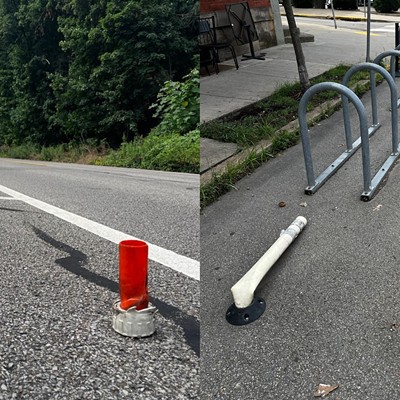The race to see which Democratic challenger will take on Republican U.S. Sen. Pat Toomey in November is getting fracking exciting.
During a debate at Carnegie Mellon University a few weeks ago, former state Department of Environmental Protection secretary Katie McGinty denied receiving campaign dollars from the fossil-fuel industry. Days later, Braddock Mayor John Fetterman released an ad claiming that McGinty received around $200,000 from that industry.
A few days after that, former U.S. Rep. Joe Sestak released an ad reminding voters that he has been calling for a fracking moratorium since he ran against Toomey in 2010.
With all this commotion over unconventional natural-gas drilling, City Paper decided to get the candidates’ detailed positions on fracking, which entails shooting chemical-laced water into the earth to extract natural gas. Environmental activists are generally opposed to fracking in the state, but others say it creates jobs and revenue.
Unlike the fight between environmentalists and oil companies, the four Democratic candidates for U.S. Senate (including Findlay Township small-business owner Joe Vodvarka, who is on the ballot but has yet to hold a public event) share similar stances on fracking. All believe we should do away with the “Halliburton Rule,” which exempts fracking from federal oversight under the Safe Water Drinking Act. No candidate is for an outright ban on fracking, but all call for increased regulations on the industry, especially in Pennsylvania, which is currently the largest natural-gas producing state without a direct tax on gas extraction, known as a severance tax.
Fetterman is calling for a severance tax of 5 to 7 percent. He believes the revenue generated by this tax should go toward funding public education. The Mon Valley mayor says he also wants to see an increase in the number of state enforcement officers.
“We need to have a department that has enough inspectors,” says Fetterman. “Pennsylvania has had enough leaks, enough contaminations and enough accidents for me to know that we are not getting it right. … It wasn’t that long ago that they were dropping [fracking waste] in the Monongahela.”
Fetterman also proposes a moratorium on fracking in the state until these conditions are met. He believes fracking should be “restricted to areas that aren’t parks and recreation centers, or areas that could contaminate our drinking water.”
Fetterman says his opponent McGinty has some conflicting interests in dealings with the natural-gas industry because of business connections to the shale gas industry she made after her term as DEP secretary.
“Katie is trying to position herself as the green fracker, and that just doesn’t fly,” he says. “That is like being a vegan rancher. It’s a paradox.”
McGinty, however, asserts that her time with the DEP dealing with energy companies puts her ahead of her opponents on environmental issues.
“I am proud to take the slings and arrows because I have been a fighter in the arena of protecting the environment and creating renewable-energy jobs my entire career,” says McGinty. “And that is something no one else in this race can say.”
As a member of former Gov. Ed Rendell’s cabinet, she says, she reinstated a fracking ban in state parks, proposed very strict regulations to cut methane emissions, and empowered DEP staff to carry out enforcement on the spot. If she were elected to the U.S. Senate, McGinty says, she would work to ban the practice of reusing fracking wastewater in new wells.
McGinty also backs a severance tax, citing the proposal she worked on as chief of staff for Gov. Tom Wolf, which called for a 5 percent tax and an additional 4.7 cents per 1,000 cubic feet of natural gas. She says the money raised from the taxes should go toward funding public education. She is not calling for a fracking moratorium.
McGinty says her opponents lack her consistency on policies and have modified their opinions on fracking. But while it appears that Fetterman has only recently called for a fracking moratorium, retired Navy Admiral Joe Sestak has indeed been calling for a moratorium since he first ran for U.S. Senate in 2010.
Sestak says he supports a moratorium until protections for the environment and people’s public health are established; oversight agencies are properly staffed; and a severance tax of 4.5 percent to 5 percent is put in place. He says tax revenue should go toward infrastructure, education and capital investments that move small businesses into areas of job growth, like renewable energy.
And he notes that this is the best time to institute a moratorium, due to the low price of gas and a resulting standstill on drilling. “This is the right time to do it,” says Sestak. “We can’t pump any more natural gas out of Pennsylvania anyway. In fact, I think one company has about 70 wells sitting there, not fracking because there is no point to it.”
Sestak says Pennsylvania governors to date have not ensured that the DEP was sufficiently prepared before supporting fracking in the state. He says fracking should not occur on public land and that children “should not see [drilling rigs] as they walk out of school.”
Allegheny County small-businessman Joe Vodvarka did not specify whether he is in favor of a severance tax, a moratorium or increased enforcement. However, he did mention a “concern for our watershed” should be kept in mind.
He says that if fracking is to occur on public land, then citizens should benefit from “preferential rates for natural gas” to lower their gas bills. Vodvarka also believes we should not be exporting our natural gas, as gas companies seek to do. “We should definitely not be tapping into our reserves and risking our environment to export those resources at giveaway prices,” says Vodvarka. “What’s drilled here should stay here.”














